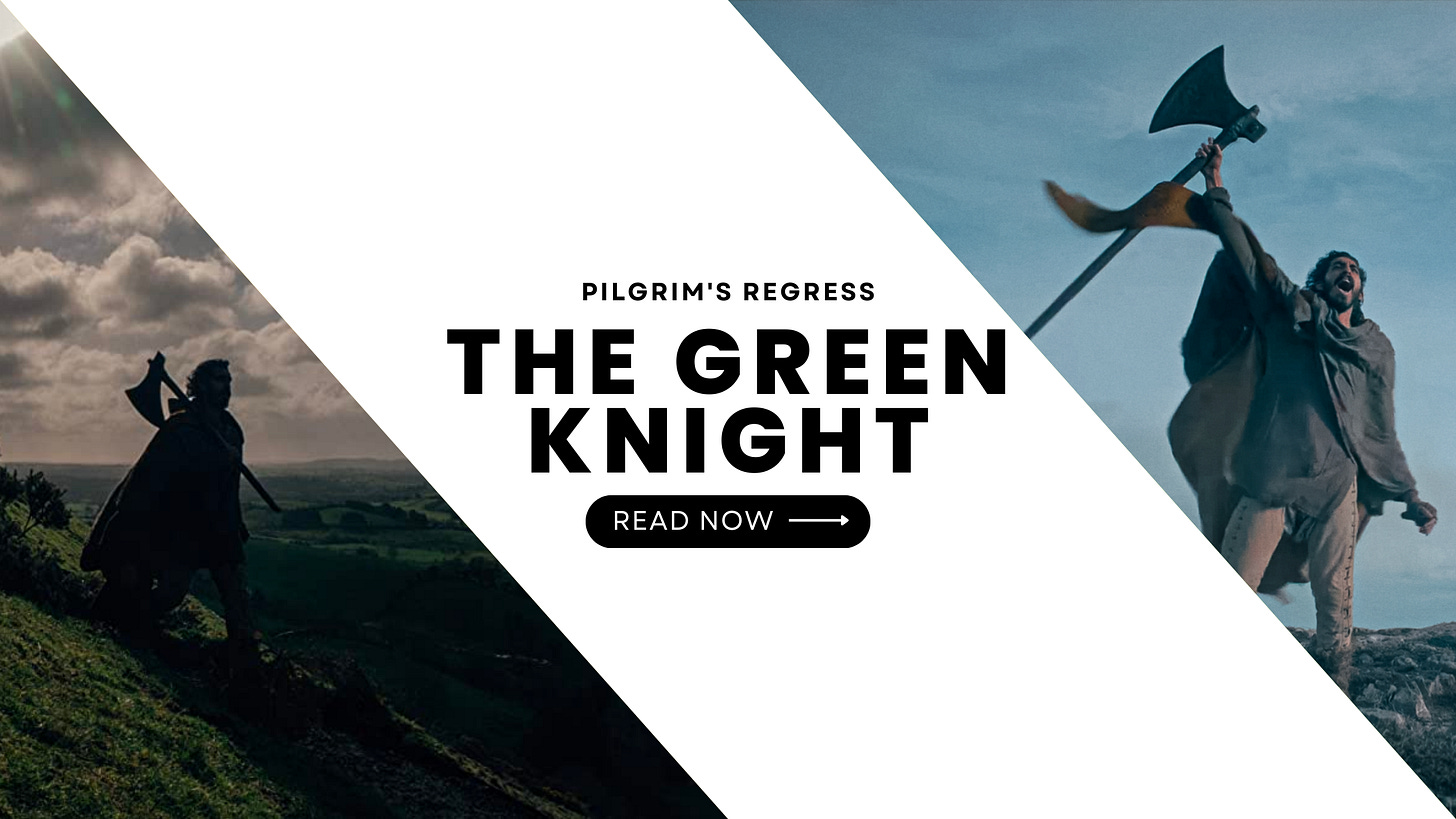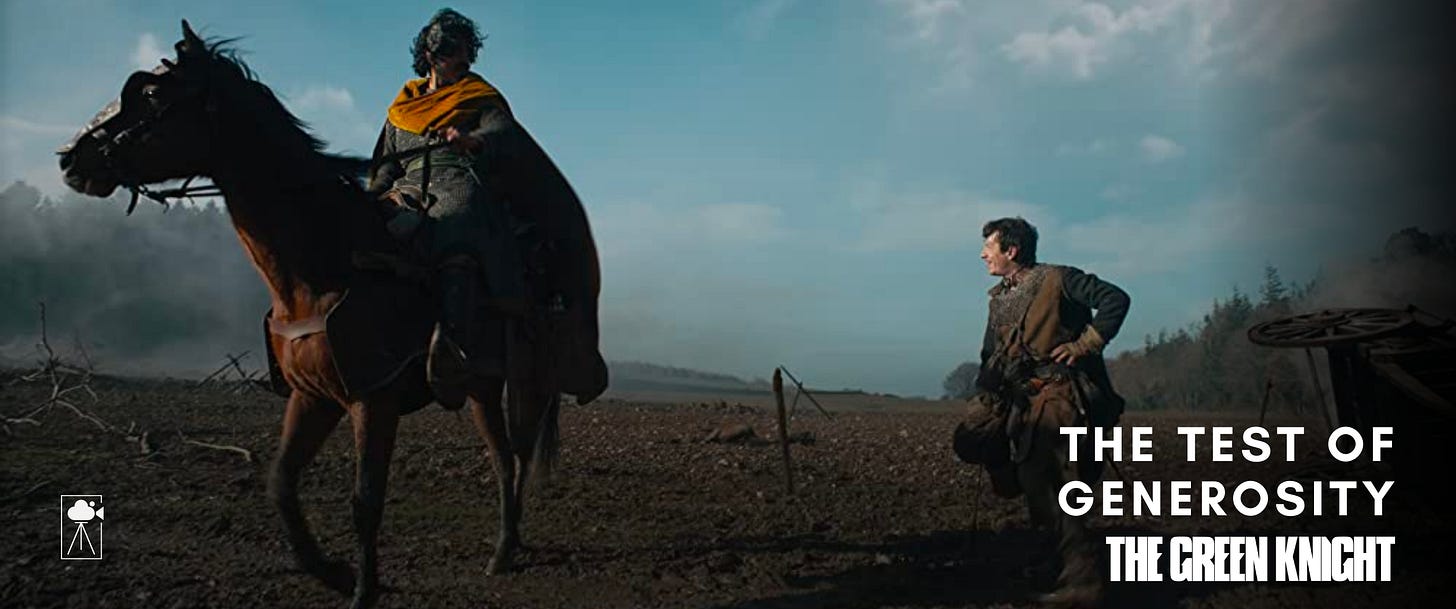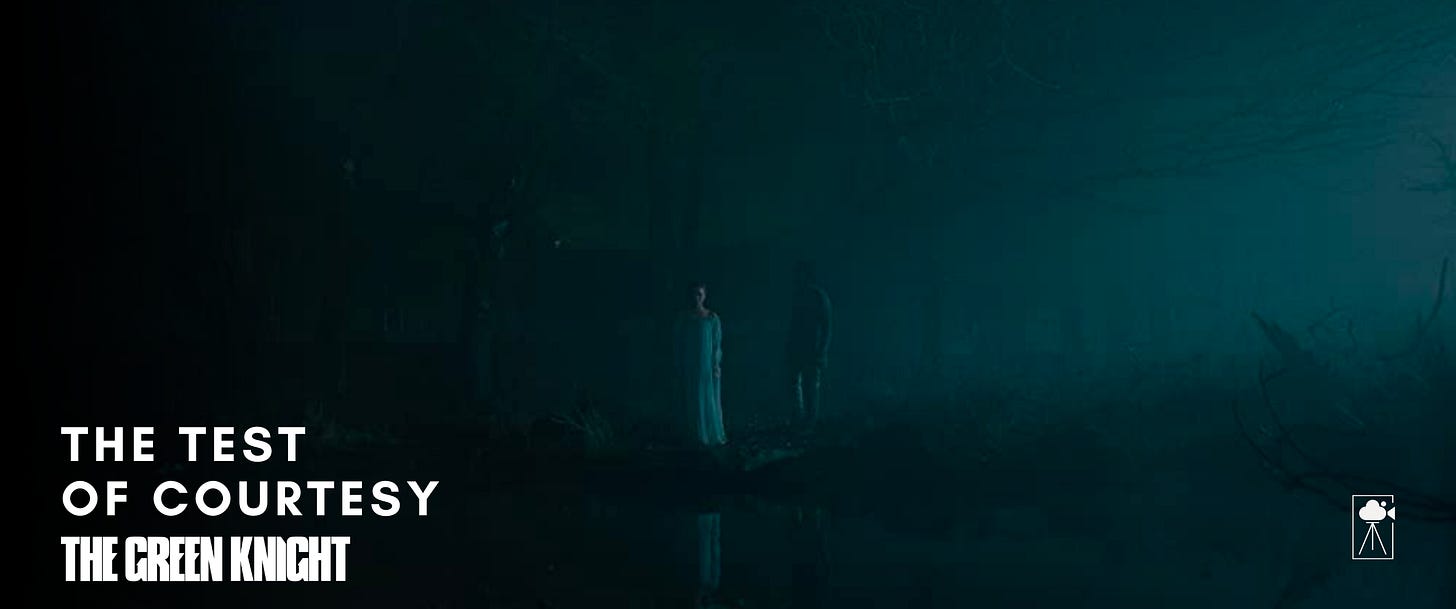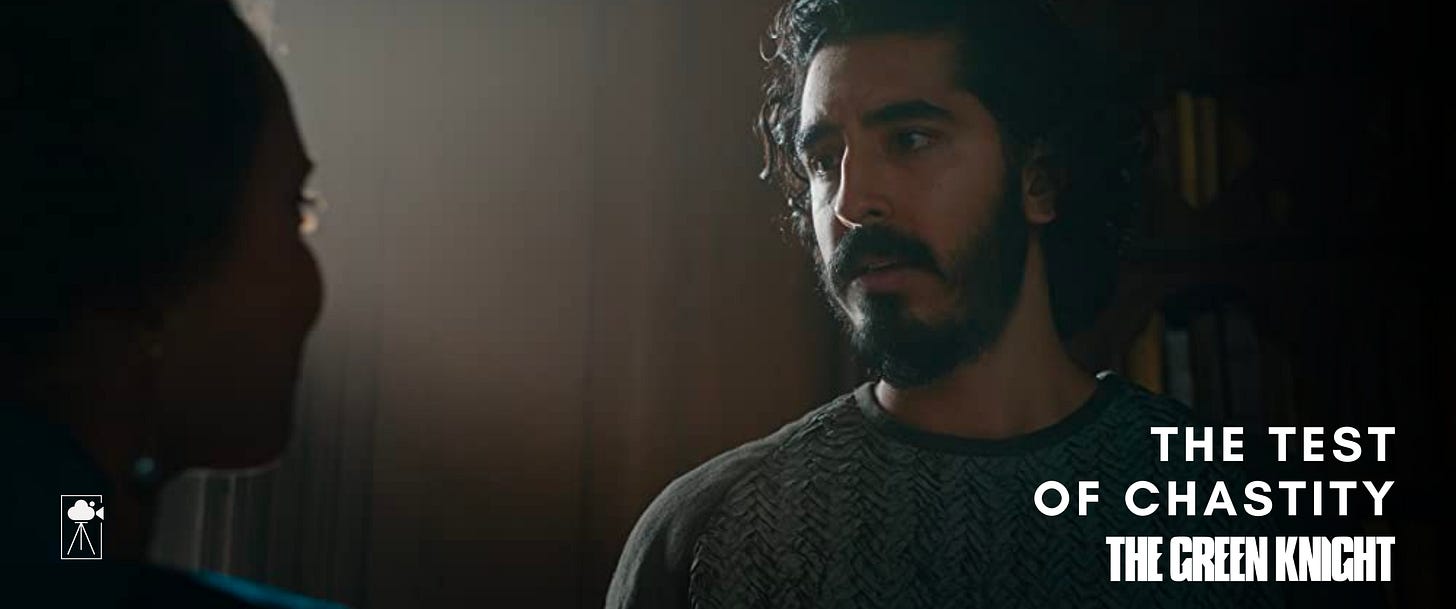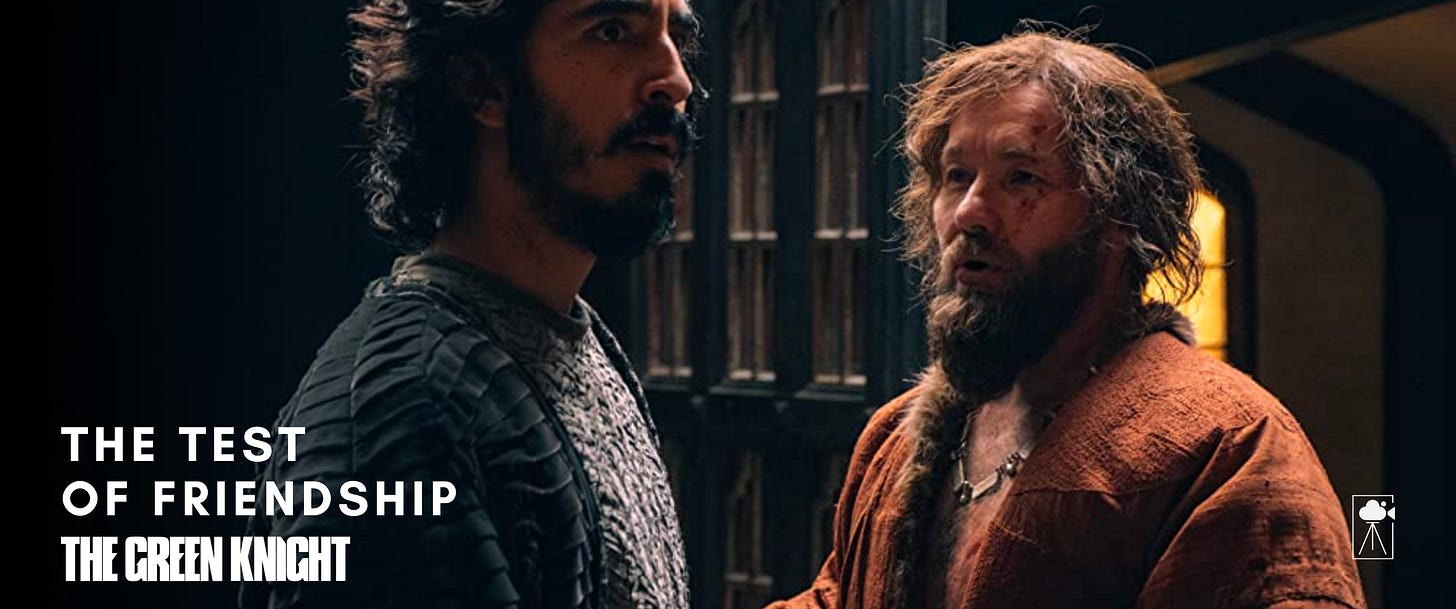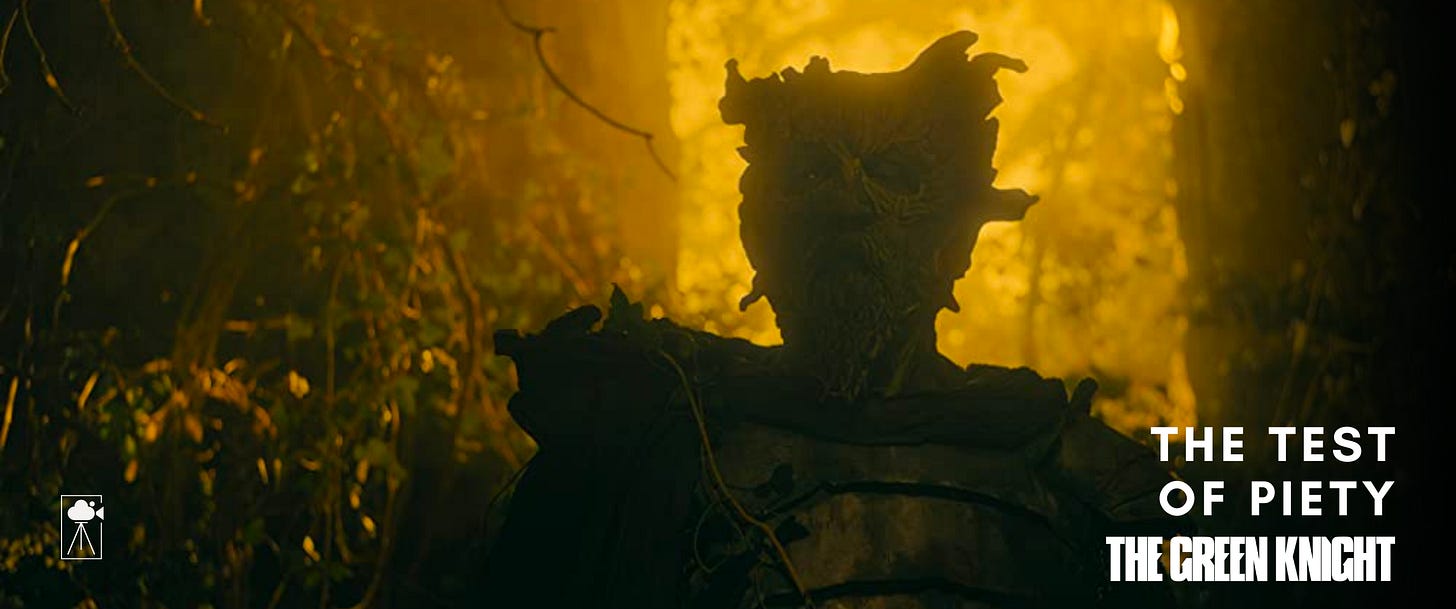Pilgrim's Regress: The Green Knight
The Green Knight presents us with a dark mirror of the hero's journey.
One of my favorite films of 2021 was The Green Knight, based on the 14th-century poem Sir Gawain and the Green Knight.
An epic fantasy adventure based on the timeless Arthurian legend, The Green Knight tells the story of Sir Gawain (Dev Patel), King Arthur's reckless and headstrong nephew, who embarks on a daring quest to confront the eponymous Green Knight, a gigantic emerald-skinned stranger and tester of men. Gawain contends with ghosts, giants, thieves, and schemers in what becomes a deeper journey to define his character and prove his worth in the eyes of his family and kingdom by facing the ultimate challenger.
What fascinated me most about the film’s structure (and Gawain’s story) is that it goes against everything we’ve come to expect from the hero’s journey. Whereas stories like The Pilgrim’s Progress show the protagonist facing obstacles and overcoming them on his way to success, The Green Knight shows our protagonist Gawain failing at every challenge that comes his way.
Furthermore, Gawain isn’t just failing at random challenges; he’s failing at the knight’s code. Christian knights such as Gawain carried shields with a pentangle, representing the five virtues they should keep - courtesy, generosity, chastity, friendship, and piety. Each encounter in Gawain’s journey is a test of one of these virtues. And as we’ll see, Gawain proves time and time again that he’s just not cut out to be a knight.
The Setup
The Green Knight opens with Gawain asleep in a brothel, immediately establishing that his character and virtues are not aligned with that of a knight. Despite this, Gawain wants to prove himself and become the knightly example that King Arthur and his men already are. Which is why when the Green Knight challenges anyone to a duel, it’s Gawain that accepts. It’s at this point that the audience starts to root for Gawain. Sure, he started out rough. But we’re about to witness him undergo the trials that will transform him into a true knight. Right?
The Green Knight states that Gawain can land one blow on him, but one year later he must travel to the Green Chapel for the Green Knight to return the same blow. In an impulsive moment of trying to prove himself, Gawain chops off the Green Knight’s head. Meaning that in one year, he must travel to find the Green Knight and have his own head chopped off.
A year passes and Gawain is now supposed to travel to the Green Chapel to encounter the knight. Even still though, we see glimpses of Gawain’s impure heart. One night the king asks him, “I’ve been waiting for you. Did you not hear me calling?” Gawain simply shakes his head no, ashamed. What a powerful statement! The king has been calling him, and Gawain simply cannot hear it. The Christian implications are clear here. Gawain isn’t prepared for this journey; he isn’t even listening for his king’s righteous voice. But alas, he takes on the quest regardless.
The Test of Generosity
Not long into his journey, Gawain is crossing a battlefield and comes across a scavenger. The scavenger directs him to a nearby stream that will lead him to the Green Chapel, at which point Gawain’s first test occurs - the test of generosity.
Scavenger: And, good sir, are my services worth anything to you?
Gawain: My thanks.
Scavenger: Nothing else? Surely a knight such as yourself -
Gawain: I am not a knight.
Scavenger: Then a noble such as yourself could spare something for a wretch like myself…Just a kindness. That's all I ask for.
Gawain reaches into his purse and produces a single coin.
Gawain: Here. A kindness.
Gawain doesn’t plan to provide the scavenger with anything for his help, and even when confronted about it, he’s hesitant to do so. He finally pays the scavenger a single coin, far from generous to say the least.
The language in this encounter is equally fascinating. Gawain is honest to a fault - he tells the boy point blank that he’s not a knight. Despite the quest he’s undertaken, despite his appearance, Gawain knows deep down that he’s not a true knight, and he’s willing to admit it.
It’s a small detail, but I also like the scavenger’s wording when he begs, asking for something “for a wretch like myself.” My mind immediately goes to Amazing Grace (“grace…that saved a wretch like me”). The scavenger recognizes his lowly position and is hoping for some grace and generosity from Gawain.
Unfortunately, he finds none and is given a single coin. Gawain has failed his first test. And he pays dearly for it too - the scavenger finds him again not long after, ambushing him and stealing his axe and horse.
The Test of Courtesy
Gawain makes it to a cabin that night and tries to rest, only to be awakened by a ghost, Winifred. The ghost needs his help, asking him to retrieve her head from a nearby spring. Again, Gawain is hesitant.
Winifred: Please help me. If you were a knight, you would help me.
Gawain: What will you give me in return?
Winifred: Why on earth would you ask me that?
Gawain seemingly learned the wrong lesson from his encounter with the scavenger! Instead of being courteous and helping the ghost, Gawain selfishly asks what he gets in return. The virtue of courtesy is missing from his heart, and he’s failed his second test.
I find it interesting that the film calls out yet again Gawain’s knighthood (or lack thereof). “If you were a knight you would help me.” Winifred is appealing to the knightly virtues that he should possess, and yet his self-serving response makes it clear that he is not one. It even catches Winifred off-guard; what type of person asks a “damsel in distress” for payment for their help?
Gawain does ultimately decide to retrieve the ghost’s head and is rewarded by having his stolen axe returned to him. But the lesson wasn’t learned, and Gawain is no closer to being a knight than when he started his journey.
The Test of Chastity
After further travel, Gawain arrives at a castle, greeted by a lord and lady who take him in. For a third time, Gawain is confronted with the question of whether or not he is a knight, leading to this conversation:
Gawain: Perhaps you think that I am something I'm not.
Lord: Such as what?
Gawain: Such as...a knight. I am Gawain only, no Sir.
Lord: Hmmm. I don't know that I believe you. Who but a knight would ride so far of his own volition to look death in the eye and submit to it? Should we put your nobility to the test?
The Lord asks a valid question - who would take on a quest ending in sure death other than a knight? It’s a great point. Unless someone was truly noble and virtuous, this would be a pointless endeavor. And Gawain has already proven his lack of virtues. So what is the point? Why is he doing this?
The Lord’s final question also contains a nice bit of foreshadowing, as Gawain will continue to have his supposed nobility tested, this time his chastity.
Gawain has several conversations with the Lady as the Lord is out hunting, growing closer to her and even kissing her one night.
The following day, the Lady gives Gawain her girdle, saying “There is an enchantment sewn into its threads. Wear it and you will never be struck down.” Gawain takes the girdle and then proceeds to engage in a sexual act with the Lady. Ashamed, he decides to leave the castle. He’s now failed at the knightly virtue of chastity.
The Test of Friendship
There’s more to Gawain’s encounter with the Lady than him simply breaking the knight’s vow of chastity. He also broke a promise of friendship with the Lord. Earlier in his stay, they made an agreement.
Lord: Let us make a promise to each other. I hunt tomorrow, and the day after. Whatever the forest offers me, I will bring you home the best. And you - you give me in turn whatever you might receive here.
Gawain: What might I receive here that is not already yours?
Lord: Who knows? This house is full of mysteries.
This request, while vague, isn’t honored by Gawain. When he eventually leaves the castle, he doesn’t offer the Lord the girdle he was given, and certainly doesn’t mention his encounters with the Lady. The Lady had even asked him as he was leaving, “Will you share with my husband what you've gained today?” Gawain doesn’t answer.
As Gawain leaves the castle, the Lord gives him a red fox as “one final gift,” leading to this confrontation:
Gawain: I've nothing to offer in exchange.
Lord: Are you certain?
Gawain: Yes.
The Lord shrugs.
Gawain has failed his friendship with the Lord, who generously took him into the home, only to be given nothing in return. This means he’s failed the first four tests of knighthood, and is about to confront the Green Knight for his final test.
The Test of Piety
Gawain arrives at the Green Chapel, ready to meet his fate and the Green Knight. But Gawain shows no signs of piety. He fears his fate, he certainly doesn’t want to accept it or be beholden to it. And in fact, he’s wearing the girdle he was given earlier that protects him from being “struck down.” He has absolutely no reverence for the challenge he himself had accepted earlier.
He kneels in the chapel, “ready” to hold up his end of the bargain. But he just can’t do it. As the Green Knight raises his axe to strike, Gawain calls out:
Gawain: Wait! Is this really all there is?
Green Knight: What else ought there be?
Gawain has no answer. The Green Knight lifts the axe a third time and is a hair's breadth away from bringing it down...when Gawain buckles again.
Gawain: No! No. I am sorry! I cannot.
I love this brief interaction, again containing all sorts of religious symbolism. Gawain isn’t a true knight (or Christian), and so he now realizes the futility of his quest. Without the honor or convictions of a knight, this was all pointless! He’s left feeling empty, as if he’s missing something from his life - and he is.
The Green Knight, either not knowing Gawain’s heart or simply teasing him, responds simply enough. “What else ought there be?” If Gawain truly was a knight, if he was a man of faith, then this should have been enough. He should have taken satisfaction in knowing he’d lived a righteous life, and in knowing that death is not the end.
But Gawain doesn’t have that satisfaction, and he clearly fears death. Gawain proceeds to flee from the chapel and the Green Knight. As he does so, we see glimpses of his future. His return home. His knighthood and eventual kingship. His marriage and children. His victories in battle. And throughout all of this, he still wears the protection girdle.
One night (clearly in the distant future), his kingdom is being invaded. Having lost all hope, Gawain removes the girdle. I’ll let the script describe this next moment:
And the moment he removes the girdle, his head rolls off as if it had long ago been cleanly cut. It rolls across the floor of the Great Hall, eventually coming to an unceremonious end. Camera pans away from them to the open door of the Hall, back into…
THE GREEN CHAPEL
And Gawain is still kneeling, and the Green Knight still stands above him, axe raised above his head, about to strike down. Before he does, Gawain raises his hand once more, staying his execution.
Gawain: Wait! Wait wait. One last thing.
He reaches under his shirt and tears off his girdle.
Gawain: Now I'm ready.
He sets the girdle beside him on the mossy chapel floor, and then lowers his head for the last time.
Okay, there’s a lot to unpack here. My description likely didn’t do it justice, but Gawain was seeing a vision of his future, much like in The Last Temptation of Christ. He sees all the successes and triumphs he could have, but all at the cost of living a fearful life. He’s always wearing the protective girdle, quite literally never removing it.
As he grows old and his kingdom is being invaded, he realizes that death is inevitable. His entire life he’s been running from death, only to see that sooner or later, death came for him. His life is no more fulfilled now than it was during his quest.
So we cut back to the Green Chapel, realizing that this was all a vision. Now having understood death’s eventuality, he removes the girdle and accepts his fate.
And that’s where the film ends, leaving a lot of ambiguity for viewers to wrestle with. From a purely textual level, we don’t even know if Gawain was killed. Did the Green Knight fulfill his end of the bargain? Or did he show Gawain mercy?
Underneath the surface, we’re also left with ambiguity about Gawain’s character. Does he accept his fate out of defeat? Maybe his journey and his vision just made him give up, resigned to a pointless life and inevitable death.
Or maybe this ending shows Gawain’s salvation. He’s failed every test to this point, but maybe he’s now been “saved” and succeeded in this final test of knightly virtues. Maybe by removing the girdle and accepting his fate, he’s actually demonstrating piety, understanding his purpose in life, in his quest, and in his death.
That’s left for us to decide - is this a sad tale of a wannabe knight’s failure? Or the redemption of a broken man, finally making the right choice?
Is this really all there is?
What else ought there be?


